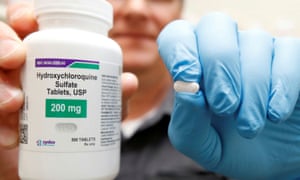Food and Drug Administration says drug is unlikely to work against coronavirus and notes heart risks

US regulators revoked the emergency authorization for malaria drugs championed by Donald Trump for treating Covid-19, amid growing evidence they don’t work and could cause serious side effects.
The Food and Drug Administration (FDA) said on Monday the drugs hydroxychloroquine and chloroquine were unlikely to be effective in treating the coronavirus. Citing reports of heart complications, the agency said the drugs’ unproven benefits “do not outweigh the known and potential risks”.
Trump criticized the FDA decision. “I took it and I felt good about taking it. I don’t know if it had an impact, but it certainly didn’t hurt me,” Trump said on Monday.
Trump said there had been “great reports” out of France, Spain and other places, without offering any evidence or further explanation. France is one of the countries that has already stopped using the drug for Covid-19 patients.
In a separate announcement, the FDA also warned doctors against prescribing the drugs in combination with remdesivir, the lone drug currently shown to help patients with Covid-19. The agency said the anti-malaria drugs could reduce the effectiveness of remdesivir, which the FDA cleared for emergency use in May.
Hydroxychloroquine and chloroquine are frequently prescribed for lupus and rheumatoid arthritis.
The FDA granted emergency use for the anti-malaria drugs in late March at the same time the US government accepted 30m doses of hydroxychloroquine and chloroquine that had been donated by two foreign drug manufacturers. Millions of those doses were shipped to US hospitals to treat patients who weren’t enrolled in clinical trials.
Meanwhile, no large, rigorous studies have found the drugs safe or effective for preventing or treating Covid-19. And a string of recent studies made clear they could do more harm than good.
The drugs can cause heart rhythm problems, severely low blood pressure and muscle or nerve damage. The FDA reported on Monday that it had received nearly 390 reports of complications with the drugs, including more than 100 involving serious heart problems. Such reports represent an incomplete snapshot of complications with the drugs because many side effects go unreported.
The FDA’s move means that shipments of the drugs obtained by the federal government will no longer be distributed to state and local health authorities for use against the coronavirus. The decades-old drugs are still available for alternative FDA-approved uses.
Dr Steven Nissen, a Cleveland Clinic researcher who has been a frequent FDA adviser, agreed with the decision and said he would not have granted emergency access in the first place.
“There has never been any high-quality evidence suggesting that hydroxychloroquine is effective” for treating or preventing coronavirus infection, he said, but there was evidence of serious side effects.
In March, Trump said hydroxychloroquine used in combination with the antibiotic azithromycin had “a real chance to be one of the biggest game changers in the history of medicine”, with little evidence to back up that claim.
He later said he took the drugs preventively after two people who worked at the White House were diagnosed with Covid-19, and he urged others to try it.
After Trump’s repeated promotions, prescriptions for hydroxychloroquine soared, contributing to shortages.
The only remaining drug with FDA authorization against Covid-19 is remdesivir, an intravenous medication from Gilead Sciences that has been shown to help severely ill, hospitalized patients recover faster.
With those in power failing us …
… at this historic moment, we demand better. From the coronavirus pandemic and police brutality to the marginalisation of minority communities around the world, leadership is broken. Devoid of the humility and inclusivity we so desperately need, and given to narcissism, leaders are gambling with public health, safety and the future of younger generations. They unapologetically prioritise serving themselves over the people they were elected to serve. We have to make them raise their game.
That’s what the Guardian’s here for. As an open, independent news organisation we investigate, interrogate and expose the incompetence and indifference of those in power, without fear. Our journalism is free from political and commercial bias – this makes us different. We can give a voice to the oppressed and neglected, and stand in solidarity with with those who are calling for a fairer future. With your help we can bring about improvement.


